- Home
- Sherwood Smith
Fair Winds and Homeward Sail: Sophy Croft's Story Page 2
Fair Winds and Homeward Sail: Sophy Croft's Story Read online
Page 2
It was he, I am certain, who saw fit to steal the new clasp-knife that Admiral Bainbridge gave me along with my pound note, which I keep hidden. The following day, my meals now to be taken in the regular way, I discovered that for midshipmen there was nothing but a large wooden bowl atop the trunks bound together that formed our table.
The Food being placed on this table, I found we had to get at it any way we could, clasp-knives being necessary for the cutting of Meat. Not having one, I grabbed with my hands. I found myself summarily denounc’d by the others, this being conduct unbecoming to Gentlemen, and I was told that Gough would at the very least chalk my fingers if he heard of my Manners, but more likely have me bound over a cannon and drubbed. Gough is a Tyrant, everyone said, as if I did not already know it. What I did not know at first, but have come to see, is that if we do our duty and stay out of his way, life for us is good, but he makes life a misery for Pascal, the third lieutenant.
But however, I was soon befriend’d by the Sergeant of Marines, who charitably lent me a knife and spoon until such time as I might be able to procure my own out of my pound note.
I know I promised that I would not get into fights, as I had promised not to drink wine, but on board ship, I have discovered that the Rules of Life are not always obtaining in the same way as it is on Land. Perhaps the details would grieve you, so I will not retail them.
Suffice it to say that my friends warned me against Bevan, said cock of the walk, so that when I was following him up to the weather deck one day, and he turned to kick me in the face, I was waiting for him, grabbed his Ankle, and though he being fifteen years old and a hand span larger than I, as well as several stone heavier, I found that determination in a scrap soon ended the Affray.
Afterward, though he ever sought an opportunity for Revenge, my friends looked out for me, as I have for them. United, we were able to avoid the worst of him, and as he had been caught twice stealing extra grog, I am glad to say when again we touch’d into port, he was exchang’d out, a new third lieutenant bringing in, as well as a replacement for Bevan.
The new fellow, a large master’s mate already shaving, we thought might cut up rough but he proved to be an excellent Fellow. He knows his Duty through and through, but having no Influence, has not got Promotion. I am afraid when I look at him I see where I will be in five Years, but I will not repine. He and the new Third are great friends, and he has taught us to Whittle.
I see I have nearly reached the end of my Paper, and as I do not wish you to pay Extra I will bring this to a close. Pray give my best to Edward, and I look forward to receiving letters from home.
Your loving brother, Frederick
Sophia read this letter over three times, then carefully folded it and laid it inside her mother’s old huswife, which was all that remained of her things. Sophia had long since transferred all her mother’s needles, thread, and scraps to her own work basket, and kept the worn bag with its old-fashioned embroidered decorations as a precious keepsake.
She straightened up, her breath catching when she felt the familiar pull under her arms. Her mourning dress was nearly grown out of, but she had less than a month to go before she would be expected to lay it aside. She had already remade two of her mother’s gowns for herself; she was grown so tall that they had not required vast alteration of seams.
A pounding noise directly overhead startled her. The dishes on their shelves rattled as boys thundered down the stairs and erupted into the room. Sophia clutched her belongings to her and backed away as they raced through the door into the garden as if released from a catapult.
Always at the last came Edward, the smallest and the most short-sighted of Mr. Gregory’s pupils. He squinted in her direction, and she bit her lip against admonishing him about that squint. He bore enough teasing as it was—and anyway she was six shillings three-pence away from being able to buy his spectacles. She saved every penny she could.
“Sophia?” Edward paused. “You are waiting for me?”
“It’s Frederick’s first letter, arrived with the morning post. He is safe, on board a ship called Olympus.” Sophia carefully opened the letter to show him.
“Olympus,” Edward exclaimed. “A jolly name.”
“Miss Wentworth!” came their mistress’s peevish cry from down the hall.
Brother and sister turned their heads guiltily, and Sophia grabbed up her precious letter in its worn huswife. “The beans,” she breathed. “They are not snapped. I’ll read it to you before bedtime. Go outside, do, with the others. You may read it later.”
Edward sighed, and turned his steps obediently toward the door, though he loathed cricket, and any other game that imposed on the blurry, vague world beyond arm’s length.
Sophia tucked her huswife under her apron as she scratched gently at Mrs. Gregory’s door. Though the curate’s wife could yell as loud as a goose honked when moved to do so, she complained that the least noise (that she did not make herself) shattered her head.
“What are you about, Miss Wentworth?” came the fretful voice as soon as Sophia was bade enter. “Sally is alone in the kitchen. If the dinner is not got ready, those dreadful boys will set up a howl, and I am already so ill.”
“I will be there directly, Mrs. Gregory,” Sophia said.
She shut the door noiselessly and as she sped back down the hall, which smelled of medicine, old cabbage, and boys, she made herself count up her blessings. She would soon be able to lay aside this horrid mourning gown. She could be toiling under the horrid scolding aunts. They would not grant her the dignity of ‘Miss Wentworth,’ for certain.
Sophia picked up the basket of beans that she had picked before breakfast, reflecting that another blessing was having Edward right there with her. And if she were very, very careful, perhaps by year’s end she might be able to save out that six shillings three-pence . . .
CHAPTER THREE
On board the Olympus:
Dear Sophia and Edward:
Gough decided we were too Easy in our duty, and put us in charge of the new ratings to train them in small arms. I thought I was obliged to tell him that I had never fired a Pistol in my life, but O’Malley, my particular friend, grabbed me and constrained me to Tace—you will remember, that means keep silent.
He said we were better off figuring out on our own than catching the punishment the second lieutenant would land on us for not “knowing our duty.” And sure enough, we were saved by our new Third Lieutenant, who took it upon himself to instruct us as well as the men.
When I got over my fear, I could see that nothing was more Diverting than the Blunders we made. We were arranged in two lines on the Forecastle, with the foremast jacks looking down and grinning at us.
Some put their muskets on the wrong shoulder. Some let the butt fall on their next neighbors’ toes. Some could not stand with their backs straight up, and looked in fright when the foremast jacks threaten’d to lash a crossbar to their shoulders. Lt. Croft did take a chalk to some, on the shoulder, that they might know right from left, until he saw that it only bothered them more.
In short, this Exercise was perform’d early every morning once the afterguard had holystoned the deck, and before we were even given our breakfast. But Lt. Croft kept at it, taking us midshipman aside to teach us the pistol until we could not only load it in under a minute, but we had a fair chance of hitting a Bottle strung from the yardarm. He is a Capital fellow, is Lt. Croft, not only a fine shot, but he is not at all like our old lieutenant. He will not take snuff from Gough, not if it was ever so.
We have rec’d orders to chase after the frigate Bien Aimee, a Frenchman sent, it is rumored, by the National Convention to arrange for grain from the Americas. It is to be All Hands soon.
I will take up my pen again when I can.
This was in a sense a prevarication.
Though it was true that the Olympus had received orders, and that the captain would soon order the ship to be put about as soon as the tide began its outward flow, Fre
derick was not certain how much of the truth was proper to relate to a sister.
He sat back in the frowsty midshipmen’s berth, squinting against the swing of lamplight at O’Malley, groaning in his bed as shadows painted long stripes over him, then slid away again in the heeling of the ship.
Ought he to describe how Gough and his particular cronies had made O’Malley drunk, then attempted to send him aloft as lookout? Then how Croft had insisted that something was amiss down in the hold that only the second lieutenant could pronounce upon, the premier being busy with the captain?
He knew he could not tell Sophia how the midshipmen (except for Tompkin, who held O’Malley’s head while he was sick) watched gleefully through the scuttles.
First Croft had challenged Gough, who tried to bluster and threaten, until he noticed the captain’s favorite topman watching the hatch, and the two burly forecastlemen waiting silently to hold the officers’ coats. Both men Gough had ordered flogged more than once, for mere trifles.
Gough was big and brawny, and relied on strength and certain vicious tricks. He had blackened Croft’s eye before he’d scarcely got his coat off, and bruised his throat by taking hold, but Croft had been taught boxing by someone who knew the art. He flung Gough off again before anyone could interfere.
And so, watched by the row of boys above and the silent sailors below, Croft thrashed Gough until he fell to hands and knees, moaning.
“Now,” Croft said. “Have we reached a gentlemen’s understanding? Or need we meet again on shore?”
“He means pistols or swords,” someone breathed into Frederick’s ear. “Zounds! How I should like to witness that.”
“I know what he means, you ape. Tace!”
Gough growled out something unintelligible that Croft appeared to accept, and a sailor silently brought a pail of water so that Gough could dunk his head to wash the blood off his face.
Afterward, the captain only said, “Mr. Croft? An accident?” Indicating the third lieutenant’s eye.
“Tripped, sir.”
“Mr. Gough?”
A thrilling silence gripped the entire crew, then Gough mumbled, “Tripped and fell.”
The captain paced the length of the quarterdeck, his back turned to his crew; when he turned back again, his face was scrupulously blank. “I trust my officers will hitherto be more careful.”
Frederick smiled at the memory, then shook his head. No, you didn’t write that kind of thing to a sister.
The expected call came. He capped his ink bottle, threw pen, paper, and ink into his trunk, and grabbed his hat before racing out.
When he returned to his missive, a packet newly hove alongside to bring the last of the captain’s supplies and to take the post before they crossed the Atlantic, Frederick had time enough to write hastily:
This letter must be sent at once. The captain had Occasion to invite Lt. Croft to dinner, and it was my turn to be invited also—and now I know enough how to go on. The captain asked all manner of questions about where Croft comes from and who are his people, what ships he has served on, and what stations. So I will finish by saying that Lt. Croft is from Somersetshire, and has an Uncle he stays with near Taunton. Fancy meeting someone at all this distance who knows the country where you and Edward now live!
They are ringing the bell, so I must seal this up and direct it.
Your loving Brother, Frederick.
CHAPTER FOUR
It was another long year before Sophia heard anything, and then the letters came in a bunch, some so waterlogged the writing was barely visible.
But by now Edward had obtained his spectacles. He and Sophia crouched over a lamp late that night, as a snowstorm howled its way around the house, and patiently examined each, Edward writing what they descried above the faint brown words, that the letters could more easily be read again and again.
“North American station!” Edward said at last, hugging his knees against his thin body. “Fancy seeing the falls of the Niagara, and penguins, and maybe even pirates, all in one place.”
“I’d as lief he never caught a glimpse of a pirate,” Sophia rejoined.
“But these dangers are long got over,” Edward said, smoothing the crackling paper.
“Yes, and who knows what dangers he is undergoing at this very minute? Well, I must not borrow trouble. I can hear Mama’s voice as if she sat with us. Come, it’s getting colder. You go off to bed. I will secure these with the others. We shall read them again on the morrow, if I can get ahead in my work.”
Edward flitted downstairs in his nightgown, and Sophia began to put the letters away, then turned back to reread certain passages. These letters were all significantly shorter than Frederick’s first ones had been, and they were full of “O’Malley said this” and “Croft did that.”
She wrote diligently, and got Edward to add to each, and Frederick in his turn scrupulously commented on each letter he received before he turned to his news, but these comments had got shorter over time. He no longer dwelled in his imagination with brother and sister, but moved on quickly to his own life. And so he ought, she told herself. He had a vastly more interesting life now, and his days were filled not only with endeavors of national importance but with his shipmates, whose dangers he shared, and who knew him as he knew them.
O’Malley and Frederick’s other friends had become brothers. So it was natural and rational that he would write of them. So why did she feel a sense of loss? She considered the letters, aware that she was catching the merest glimpse of his life in the great world among unimaginable sights. She and Edward had only what he chose to share.
That was a fine thing, of course, she assured herself hastily—as if her thoughts somehow might be deemed disloyal. But though she would never speak the words aloud, she could not forbear worrying that whenever he was able to come home again, would anything remain of his family feeling?
The winter passed, and with it spring, summer, and another autumn.
Between Frederick’s letters, life trod on through each day, Sophia laboring at housekeeping and Edward at his desk.
When Mr. Gregory set the tone at dinner by talking of world events with his pupils, those events seemed ever more alarming, especially the tidings arriving out of France. Robespierre and his compatriots apparently had set themselves the task of beheading everyone in their kingdom without a king—except for the soldiers and sailors sent out to make war.
Sophia was only able to leave the house to go to church, following behind the quiet pairs of boys, the two housemaids behind her. At church they sat isolated in the gallery so that she looked down on Dr. Gregory’s bewigged head. After divine service, Mrs. Gregory saw to it that they marched straight back again, without the maids or Sophia having an opportunity to disgrace the household by dawdling.
Sophia might also be sent to the butcher’s or the fishmonger’s, but Mrs. Gregory always watched the clock. So horrified was she at the very idea of Sophia or the maids discrediting her reputation by what she termed Gadding About that they scarcely were able to complete their errands in the time allotted lest they get scolded in a tirade lasting far longer than the errand had. Consequently, though Sophia knew the names of all the shopkeepers, she had rarely exchanged more than “Good day to you” with any of them.
And so another year wound its way through the seasons.
Edward unexpectedly shot up so that the top of his head nearly reached Sophia’s nose, and his limbs, once so neat and childlike, had begun to lengthen so that all his shirt sleeves had to be reset.
And it was not only his clothes. Sophia had had to let out the seams in two dresses, and from the uncomfortable fit, it was clear that it was all to be done again, but when would she find the time? That pile of mending seemed to have no bottom. The pupils wore out their stockings and rent their shirts faster than she could set them to rights. How she loathed sitting in a stuffy corner plying her needle for endless hours!
At least spring ripened into beautiful weather, and she
could open a window to glance outside. And every retort Sophia bit back, every extra dish washed and scuff mark scrubbed—why was it that boys saw fit to leap up and strike the lintel above the door with their grubby hands whenever they came or went?—was deemed worth her effort one day.
Mr. Gregory entered the schoolroom, waving a letter, and interrupted the boys at their translation of Thucydides. “Now, this is what comes of diligence and attention to duty,” he announced as the boys threw down their pens, glad for any excuse not to be construing. “Master Wentworth, the youngest amongst you, hath earned a scholarship at St. Winstan’s!”
He read out the letter, pausing after every fulsome phrase to observe the effect on his pupils. At the end, he declared, “You know our custom. I have given orders for a celebration, after which you boys will gain a free afternoon. And tomorrow, I expect a renewed attention to diligence in the rest of you!”
Even Mrs. Gregory emerged from her bed long enough to partake of the seed cakes, ratafia biscuits, and the precious Yellow Escubac only brought out for the most special occasions. The boys heartily enjoyed the repast, and then escaped out to play, sweeping Edward with them, as Mr. Gregory observed with satisfaction, “That makes the tenth scholarship we’ve accomplished. Ten is a number that looks well in advertisements.”
“Indeed, Mr. Gregory,” his wife said plaintively, looking around at the faded, much-cleaned hangings. “It warrants a raise in our fees, do you not agree? The house is growing sadly shabby, and I don’t mean to complain, as I believe I know my wifely duty as well as anyone, but I can scarcely hold up my head in your father’s church, wearing that old bonnet of mine, and if Dr. Gregory can look upon that and not see his way to doing anything for us—”
“We have conversed on this head,” Mr. Gregory rejoined dully. “My father has done everything he can, but with seven of us all with equal claims, and that does not even count my sisters . . .”

 Inda
Inda Danse De La Folie
Danse De La Folie King's Shield
King's Shield Whispered Magics
Whispered Magics Fleeing Peace
Fleeing Peace Barefoot Pirate
Barefoot Pirate Crown Duel
Crown Duel Mearsies Heili Bounces Back
Mearsies Heili Bounces Back Commando Bats
Commando Bats A Stranger to Command
A Stranger to Command Lhind the Spy
Lhind the Spy The Spy Princess
The Spy Princess Blood Spirits
Blood Spirits Sasharia en Garde
Sasharia en Garde Lhind the Thief
Lhind the Thief Paradise Drift
Paradise Drift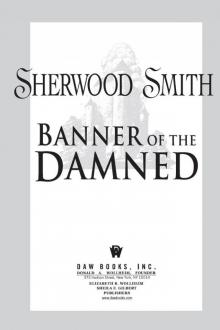 Banner of the Damned
Banner of the Damned The Trouble With Kings
The Trouble With Kings Poor World
Poor World Treason's Shore
Treason's Shore Wren Journeymage
Wren Journeymage A Posse of Princesses
A Posse of Princesses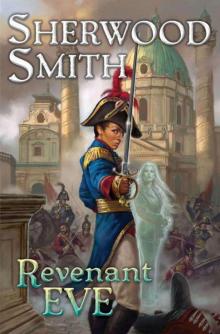 Revenant Eve
Revenant Eve Once a Princess
Once a Princess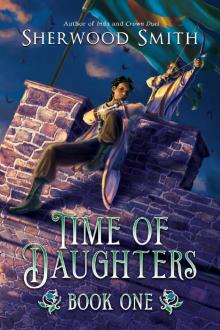 Time of Daughters I
Time of Daughters I Rondo Allegro
Rondo Allegro Coronets and Steel
Coronets and Steel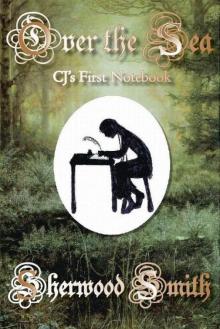 Over the Sea
Over the Sea Senrid
Senrid Hunt Across Worlds
Hunt Across Worlds A Sword Named Truth
A Sword Named Truth The Fox
The Fox Twice a Prince
Twice a Prince Fair Winds and Homeward Sail: Sophy Croft's Story
Fair Winds and Homeward Sail: Sophy Croft's Story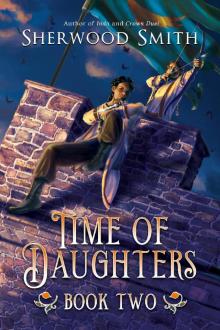 Time of Daughters II
Time of Daughters II The Rifter's Covenant
The Rifter's Covenant The Phoenix in Flight
The Phoenix in Flight Stranger
Stranger The Thrones of Kronos
The Thrones of Kronos A Prison Unsought
A Prison Unsought Twice a Prince: Sasharia En Garde Book 2
Twice a Prince: Sasharia En Garde Book 2